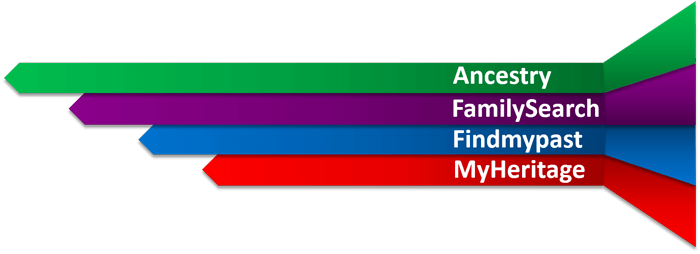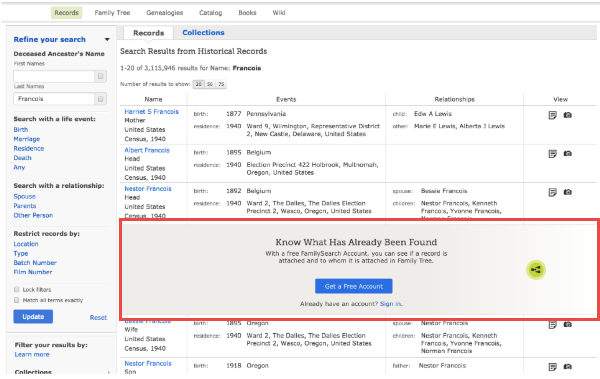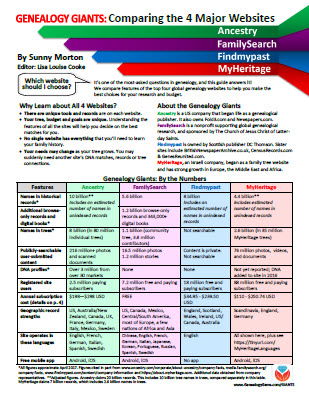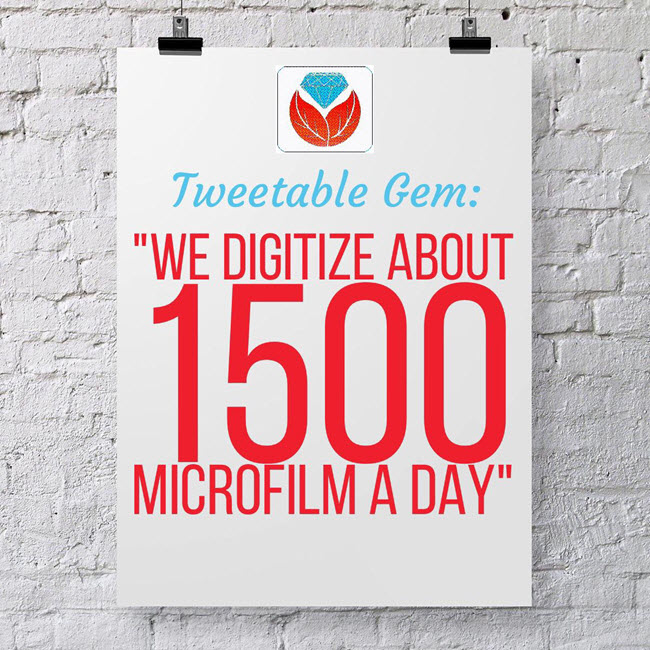by Lisa Cooke | Dec 2, 2017 | 01 What's New, Beginner, FamilySearch, Freebies |
A free FamilySearch account gives you access to more historical records and customized site features than you’ll see if you don’t log in at this free genealogy website. Here’s why you should get a free FamilySearch account and log in EVERY time you visit the site.


This post is part of our ongoing commitment to help you get the most out of the “Genealogy Giants:”
In this post, I comment on a recent announcement from the free giant everyone should be using: FamilySearch.org.
Why you should have (and use!) a free FamilySearch account
FamilySearch.org has always allowed free public use of its site. But beginning on December 13, 2017, the site will now actively prompt visitors to register for a free FamilySearch account or to log in with their existing accounts. Anyone can continue to search the catalog and user-submitted genealogies, explore over 350,000 digitized books, learn from the Wiki and the learning center, and even view user-contributed photos and stories. But by requesting you to log in, FamilySearch wants to remind you that this is your path to even more free records and services on the site.
Here are my top three reasons to have and use a free FamilySearch account:
1. Access more free historical records on FamilySearch.
We’ve talked a lot in recent months about best strategies for accessing digitized and off-line historical records at FamilySearch. Some of the digitized records on FamilySearch are there courtesy of a partner organization, which may restrict record access to those who log in on the site.
One woman had an “ah-ha” moment of realization after reading FamilySearch’s announcement. She posted in the comments, “Though I have had a free account for some time, I did not realize that FamilySearch was not giving me full access to information in record searches just because I had not logged in. Maybe I need to redo my past searches as a logged-in account holder.”
2. Participate in the global Family Tree.
As I more fully describe in my quick reference guide, Genealogy Giants: Comparing the 4 Major Websites, FamilySearch’s online family tree is different than the tree systems used at the other major family history websites. Instead of creating your own personal tree, you participate in a collaborative, unified family tree of the world. As a logged-in visitor, you can enter your information, then that of your parents and their parents, etc. until you connect to deceased individuals who are already on the tree. (Information about living individuals is always privacy-protected.) Then you may, with other descendants, contribute what you to know to an ancestor’s profile.
Anyone may make changes to these public profiles, which may at times be frustrating. But it also allows for more focused collaboration. This is a great place to see a virtual compilation of others’ research on particular ancestors without having to search others’ personal trees individually, as you do on other sites (remember to look for their source citations and verify what others say). The Family Tree on FamilySearch is also a great place to digitally archive family documents and photos where other researchers may see and appreciate them for free. As you can see in the screenshot below, logging in also helps you see how others have identified the folks you see in your search results:

3. Get customized help.
Those who log in with a free FamilySearch account have access to one-on-one assistance through the website. If you have a question about using the site, accessing records, finding additional records about your ancestors, or even how to understand the records you’re looking at, you can email or call a live support person for help. Your login also sets you up to receive customized alerts and seasonal messages (like “Did you know your ancestor fought in the War of 1812?”) and a dashboard experience with at-a-glance reminders of record hints awaiting your review, where you left off in your last online session, tips about what to do next, and more. Here’s what the dashboard looks like:

How to get (or recover) a free FamilySearch account
See Registering to use FamilySearch.org for information about creating a free account. FamilySearch accounts have always been free and, the site assures us, will continue to be free. You will need to provide your first and last name, a username, a password, and an email or mobile phone number.
According to FamilySearch, your login and other personal information:
- enables collaboration in the Family Tree and Memories areas of the site (you control how much information is shared)
- “allows you to send in-system messages to other users without revealing your personal identity or email address”
- “allows FamilySearch to send you emails and newsletters (you can specify how many emails, if any, you receive)”
- enables communication when you contact their online support team for help
- will not be shared “with any third party without your consent”
If you’ve already got a FamilySearch account but have forgotten your username, click here. If you’ve forgotten your password, click here.
Genealogy Gems Brings You Genealogy Giants
 Each of the “Genealogy Giants” has so much to offer family historians around the world! But it’s hard to keep them straight, compare their top features, and get the most out of them without some inside help. That’s why we published the must-have quick reference guide, Genealogy Giants: Comparing the 4 Major Websites, your personal comparative tour of Ancestry.com, FamilySearch, Findmypast, and MyHeritage.
Each of the “Genealogy Giants” has so much to offer family historians around the world! But it’s hard to keep them straight, compare their top features, and get the most out of them without some inside help. That’s why we published the must-have quick reference guide, Genealogy Giants: Comparing the 4 Major Websites, your personal comparative tour of Ancestry.com, FamilySearch, Findmypast, and MyHeritage.
This inexpensive guide can save you hours of wasted time hunting down the records you need. It can save you hundreds of dollars by helping you invest in the genealogy websites you most need to use right now–because your research needs change right along with your growing family tree! The guide is available for your immediate reference as a digital download or get a handy, high-quality printed copy you can keep with your genealogy research files.
by Lisa Cooke | Aug 22, 2017 | 01 What's New, Genealogy Gems Podcast
Change is something we can always count on, but that doesn’t make it any easier, does it? Understanding why the change is happening, how it affects you personally, and what you can do to adapt, does. So, when FamilySearch announced the end of their long-standing microfilm lending program, I immediately sought out the key expert who can answer these questions for you.

FamilySearch’s Goal for Microfilm and the Family History Library
It seems like only yesterday I was interviewing Don R. Anderson, Director of the Family History Library about the future of the library and FamilySearch. Back then, in 2009, he made the startling statement that their goal was to digitize all of the microfilms in FamilySearch’s granite vault. (Click here to listen to that interview in my Family History: Genealogy Made Easy podcast episode 16.) Fast forward to today, and we see that in less than ten years that end goal is within sight. We are also seeing the ending of a service nearly every genealogist has tapped into at some point: the microfilm lending program. Family historians have been able to place orders for microfilm to be shipped to their local Family History Center where they could then scroll through the images in search of ancestors.
On August 31, 2017, this service comes to an end.
Fear of the Unknown
It’s sort of scary to see this come to an end before every last roll of microfilm has been digitized and put online (just head to social media to read some of the concerns). It’s definitely been comforting to know that the records you need are just an order form and two weeks away.
I have always found that being armed with information helps alleviate fear, and so upon hearing the news, I reached out to FamilySearch to arrange a special interview with Diane Loosle, Director of Patron Services at FamilySearch. In this special Genealogy Gems Podcast interview, we take the time to really comb through what the end of the microfilm lending program means for you, and what your options are for records access going forward. I’ve been anxious to get this information into your ears and hands, and have spent the entire weekend producing this episode and transcribing it for you.
The Interview: The End of the FamilySearch Microfilm Lending Program
Lisa: One of the constant challenges for genealogists is gaining access to genealogical records that they need for their particular family history research. I imagine that you’ve had that challenge yourself. Thankfully, since 1938 the FamilySearch organization has been microfilming records around the world. They’ve been making these records available through the Family History Library in Salt Lake City, and through a tremendous lending program with their Family History Centers located worldwide. And that may be where you’ve gotten your hands on a couple of microfilms and records over the years. But of course, as the Internet has been more accessible over the last two decades, this is changing the landscape of record access. So more and more we are gaining access to digitized records online, and this has led to a really big change in the long-standing microfilm lending program.

I’ve invited Diane Loosle, the Director of Patron Services Division at FamilySearch, to talk about the change that’s occurred, what it means for you, and what your record access options are going to be going forward. Diane, thanks so much for joining me today.
Diane: I’m so happy I could come, and thank you for inviting me.
The Reasons Microfilm Lending is Coming to an End
Lisa: I imagine that you’ve been very busy with the changes. I know that the last day of the microfilm ordering was August 31, 2017. And you know FamilySearch has been digitizing records for years, so we are going to be shifting from microfilm to digitization. Why is right now the time that the change is happening, where you’re actually discontinuing the physical microfilm lending?
Diane: This is such an exciting time Lisa. We’ve been looking forward to this day for many, many years because when you think about the fact that you can get access to these images immediately in your home, for the most part – there are some that you have to access through a center or library, but the majority are in your home – that’s pretty wonderful. And so we are moving to a place where all of our fulfillment for your needs for your records is going to be digital and that’s what this change is all about.
So the reason that it’s happening now is that, a couple of different reasons. First, we have moved through a lot of the microfilm and have had those digitized and they are up online. So it was a good point with that.
We’ve also seen a huge drop in the orders of microfilms. So there’s not very many being ordered now, so that kind of lined up.
And then also our supplier. We have a single supplier for vesicular microfilm, and I think that’s important to understand that we’re talking about a certain type of microfilm because we use that type to make the copies and send them out to you. We have a single supplier, and that supplier has been kind of raising prices and giving us the indication that they would rather not be in that business. And so with all those things together, and the fact that we would like to take the resources that we are currently using to duplicate films, and send them out, and ship them and all of that, we’d like to take those resources and move them towards bringing you more records digitally.
It seemed like the right time to make this decision to finally finish it. Now we do have some of the collection that has not been completed of course, and I think that’s what’s causing most people concern is, “What happens? Can I get access to that during this time that you are still finishing it off?”
Lisa: Exactly, and you know I have visited the distribution center for your lending program, and it was massive and it looked really complicated. And then when you add on the idea that the access to the actual film itself is changing.

I just got a camera from my uncle, and it’s got 25-year-old film in it. It took me all day to find a local store that could develop it for me!
So, it’s like a perfect storm of a lot of technological changes, which is exciting, because as you said we can access things from home.
Digitization and Publishing Limitations
I know that when it comes to the microfilm that you guys have, the goal has been to digitize all of it. But explain to folks what the limitations are in terms of, do you have the rights to lend it, do you have the rights to digitize and put up online everything that you have microfilmed?
Diane: Right. So we are always limited by the rights associated with the collections because the record custodians stipulate those when we do the agreements. And in microfilm, we’ve been circulating things. Our intention is to circulate digitally everything possible legally for us to do. And that’s the majority of the collection.
Now in the process of doing this, what’s happened over the years is that laws have changed around Data Privacy, particularly in Europe and some other locations around the world. And as we’re going through and reviewing all of these, you can imagine these thousands of contracts for this process, we’re discovering that there are some that because of the changes in the Data Privacy laws, they really should not have been continuing to circulate because of those changes.
So those would then in the future be restricted because of the Data Privacy issues. And those are usually very modern records, those that have living people in them.
So there will be a set of records that maybe you could have gotten on microfilm previously that you would not now be able to get digitally. But that’s because they shouldn’t have been in circulation anyway because of the data privacy changes. But for the most part, what we’re circulating microfilm-wise you will have access to digitally.
Now, about 20% of the collection you have to access through the Family History Library, or through a Family History Center or affiliate library because of the contracts we have. And that was also true with the microfilm of course, and now it’s true with the digital images as well, based on the contracts, so there will be a certain set that is in that category.
Family History Center Affiliates
Lisa: Help us understand what affiliate centers are.
Diane: Affiliates don’t have to return the film they have. Affiliates are usually public libraries or Family History Centers in an LDS chapel. Local leadership will decide. So if they keep them, you can still access them. And the Family History Library in Salt Lake City will maintain a large microfilm collection as well. Go to familysearch.org and in the right corner, you’ll find the Get Help link (and click Contact Us). Search by zip code for affiliates near you. They will appear on a map. Libraries have extended hours compared to Family History Centers.

The best way to find out where the films are still located, both physical and digital, is the FamilySearch Card Catalog. Many people aren’t that familiar with the card catalog. Look for the Camera icon, then click to go to the document image.

Lisa: Let’s dig into that a little bit. So we’re talking about, you mentioned the term “affiliate centers” and I know that there are some locations which aren’t technically affiliates. Can you help define that for us? How do we figure out, before we make the jaunt over to the local family history center if that’s one that actually can still have some of the microfilm. Help us sort that out.
Diane: So if you go to any center or affiliate library out there, and I’ll tell you how to find those in just a minutes, they can keep whatever film they already have on hand. There’s nothing that’s saying that they need to send it back. Now that is dependent on decisions made at the local level. So, you know, the leadership of either the affiliate library, which is normally in a public library, or a family history center which is often in an LDS chapel, the local leadership there will make a decision about, you know, the film and what happens to them in the future, but we’re not asking them to send them back. So you’ll still be able to access them. And the library here in Salt Lake will maintain a large microfilm collection as well. So, it will still be available that way.
Now the way that you find these locations is if you go into FamilySearch, up in the right-hand corner there’s a Get Help link, and the Get Help link lets you get in touch with us. And then you can search actually using your zip code to find which centers and affiliate libraries are near you, and both will appear on the map that appears. So, uhm, you can find out which ones are near your location.
The affiliates are, as I said, often public libraries, so they may have extended hours beyond what the family history center might have because the family history center is often as I said in a chapel and manned by volunteers. And so they may not have as many hours as your affiliate libraries may have.

How to Identify Where the Films are Located
Lisa: So whatever they may have had on hand when the lending program came to an end, they had the option to decide if they were going to hang onto it, or if they were going to send stuff back. There’s going to be some just at the Family History Library in Salt Lake City. Do we go into the card catalog to identify where the existing films are still located?
Diane: Yes, so the best way to find out what’s available both digitally and where the films might be physically located is through the FamilySearch Catalog on familysearch.org. So if you go to Search on FamilySearch, and then Catalog, you can look up your location, look up the records your interested in, and it will tell you where those can be found.

Now, if it’s available digitally, and actually most people I’ve talked to where they would have this concern about “oh goodness, I’m not going to have access to my films!”, when I’ve talked with them, and we’ve looked them up, their records were already available digitally, they just didn’t know it. So, if you go in the catalog and look it up where it lists the microfilm, there will be a little camera icon out to the right-hand side, and if you see that little camera icon, you can click on that and that takes you straight in to the digital images for that record.
Now we publish those, we do about digitize about 1,500 microfilms a day at the vault. And we publish those pretty immediately up on to the website through the catalog. You will not find those through the Historical Records part of FamilySearch under Search Records. They’re just through the catalog, so there’s a much larger collection available through the catalog than what you see in the Historical Records section.
How Films are Prioritized for Digitization
Lisa: When we get notifications, I know I get your press releases and such on the new records that are coming out, does that include those? Because we do publish every Friday kind of a run down for all of our listeners out there, what the newest records are that are coming online.
Diane: It does not currently. That publication only includes things that are published online in the Historical Records section of the website. However, with this change, we’re looking to change that so it will include those being published to the catalog. Now the challenge with that is the volume! Because 1,500 films a day is a lot.
And these films, because the way that we did this initially, we prioritized all of the films that had been ordered in the last five years to make sure that those were available digitally, so it’s been kind of piecemeal a little bit.
So, you might have two or three films in a full collection that have been digitized and the rest maybe not, at this point, and so trying to help you understand what is and is not available through that publication. We’re still working through the details. But the intention is, as we go forward, will be to prioritize filling in those collections where maybe one or two films have been digitized and the rest have not yet. We will go through and make sure the whole collection has been digitized. And then we are going to introduce a process where you will be able to let us know if there is a film that you absolutely need. You can let us know, and we will work that into our prioritization and try to get that to you as quickly as we can. You know if you think about how long it took to get a microfilm to be delivered to you once you ordered it, you can think about it’s kind of the same time frame when it might then be available to you digitally.
How to Request that a Microfilm be Digitized
Lisa: How could they be contacting you to make that kind of request?
Diane: We are working on that process right now, trying to finalize it. So there’s kind of two options we’re looking at at the moment: One, you would contact us through our support line, the Help Line. The other is that we would just have a form up that you would fill out. Now the form is going to take more time to get established and up. So we may go out of the gate with not as ideal of a process, but we want to make sure that we can let us know, so we’ll be clear about what that is as we get closer to September 1st.
Lisa: When we get into the catalog, have you already flagged which ones are going to have restrictions, they are just not going to be able to be digitized? Because I think some people might be thinking “Maybe I should just hold on and wait, over the next couple months maybe they’ll get to this one, I’ll put in a request.” But I imagine that’s going to be a big job if you have to go in and try to flag every single one that you know you’re not going to have the rights to digitize. Tell us how you’re going to deal with that.
Diane: Well, that has not occurred and would be pretty impossible to do at this stage, just because of the volume of what we’re dealing with trying to go through. We’re doing it as we go to digitize the films. And so, we discover it as we go, as opposed to knowing it ahead of time.
Lisa: So if they put in a request, you pull it out, go ‘OK well let’s look at doing this,’ and then realize, no, this one’s not going to be able to do it. Then at least they would get that information?
Diane: Yes, they would. Well, what would happen is we’re working on a way so that in the catalog you would be able to identify that. So for example, a request actually came from the community out there that we be able to distinguish if a record can be viewed in my home, or if I have to be at the facility to view it, or if there is some other restriction on it. And so, because of that feedback, we thought “So let’s see if we can figure out a way to help people understand that.” Now, these things probably won’t be ready right out of the gate. But we’re looking for ways to make it simpler for you to understand what the challenges are with the record that you’re trying to access.
Gaining Access to Microfilm and Some Restricted Digitized Records in Person
Lisa: Sure. So, if we’re looking online and we see a record, and it’s not been digitized yet, would we at this point, until you get more formalized processes going, would you still encourage people to get in touch with the Family History Library in Salt Lake City? What other options are they going to have to gain access?
Diane: So first what I would do is I would look, because we’ll maintain the film inventory, so we know where the films are located, so I would first look and see, is this film available somewhere near me? Or if I have an opportunity to come to the Family History Library, and the film is there, great. But, so first look and see if you can locate it, then you can let us know through the channels that we’ll have available to you what the film is, and then we’ll put it into the list to be prioritized to be digitized. But I would always encourage folks to look and see if they are located near where that film already is because that would be much quicker for them to get access to that.
Lisa: If Salt Lake City is the only place, then, of course, this really whittles down to the big fear of everybody, is “Oh that one film I’m going to need, it’s only going to be in Salt Lake City and I can’t get there.” What other kinds of options might a person like that have?
Diane: Well, so I think that there are some options available to them because we have a large group of professional researchers who come to the library every day, and those folks could probably be useful to you in looking up those records and getting copies of whatever is needed. So that’s one option that people could take to do that.
The majority of what we’ll have, I don’t think the case would be that the only place you can get it is the Family History Library. If we do have a fair number of collections that are in that category as we finish this process off, then we’ll look at ways to provide some access where we can. But that access would probably be in a digital way as well. So that would be my suggestion, that they reach out to those who are here every day and could take a look at that. And I think you know there are other websites where you can get access to professionals as well, or just good samaritans, you know, that want to help you out.
Lisa: Absolutely, and there are lots of those. Finally, are there any records that the people listening are going to completely lose access to?
Diane: The only ones that would be in that category is because of data privacy. So, if there was an issue with, you know, a law changed, that made it so that we could no longer provide access to those. But that would have been true in the microfilm world as well.
Lisa: Exactly. So really, it really doesn’t change in that respect. We’re not losing records, we’re changing up how we access them. And I think you’ve helped shed a lot of light on kind of what the process will be and it sounds like you have a big job ahead of you.
“We’re not losing records, we’re changing up how we access them.” Lisa Louise Cooke
Shifting Resources to Meet the Goal
Lisa: How quickly do you think it’s going to help once the lending process is let go of, that the resources start going to all of this other work now that you have to do on the digital side?
Diane: I think it will move pretty quickly for us to, you know, start to do more with the resources we have. For example, we’re collecting around three million images with three hundred camera crews out there, about a week. So, that’s a lot! And we want to shift a lot of resources. Another place we’d like to capture more is with Africa and the oral genealogies project that we have, and gain more access there. So, we’ll be shifting to those. And then, of course, the vault is moving at a pretty good clip already, with about 1,500 films a day, so I think we’ll be able to keep up pretty well with the demand that’s coming at us from people. But, we’ll evaluate that as we go, and determine if we need to boost up more there or not, to be able to move more quickly for folks.
Empowering Genealogists to Learn More
Lisa: Any other questions that I didn’t think about that you’ve been hearing online, in social media, that you’d love to give us some input on?
Diane: Well, we have had some questions from some of the affiliate libraries about how do they get the access? So that’s been happening online a little bit. And so we just want them to know that we’ll be reaching out to them via calling all of them actually, and helping them through this process of setting up the things that they need to technically to be able to get access to the images digitally. So that’s definitely something they should know.
The other thing is that we have a lot of people who don’t actually know how to use the catalog [laughs] because you know they’ve grown up in a search world, or looking at the historical records the browsable images, and a lot of people don’t understand that there’s a lot of different ways to access the records on FamilySearch. So you have Search, which is a very small percentage of the collection actually, compared to the whole, and then you have the Historical Records that are only browsable, and that you can go in and look at the images browsing, and then you have everything that’s been published through the catalog. So there’s kind of three places that they need to look. So I think that’s the biggest piece I’ve seen: people just don’t know. They’re not aware of where to find those things. And you know eventually, it will be nice, maybe when those things come together. But at this point in time, they’re separate. And that’s because we wanted to ensure that you would maintain access. If we could just publish them quickly and maintain access for you, that’s the best in our minds.
Lisa: Absolutely! Well, I know that Sunny Morton here at Genealogy Gems is going to be joining us in future episodes talking more about just those different areas. And I love the way that you kind of laid it out for us because I think a lot of people weren’t that familiar with the differences. And she’s going to be helping us get a little savvier in that ongoing research.
Diane, thank you so much for taking time to visit with me, and to answer some of the questions. I know that you know that the emotions that run high are only because people are so passionate about family history, and they are so appreciative of what FamilySearch has done. It’s been an amazing resource that you guys provide to the public for free, which is just absolutely invaluable. And I know that I have a lot of confidence in where you guys are going because you always are out there looking forward. How far out into the future you guys look and you plan for is just phenomenal! It’s not just about us accessing records, it’s going to be for generations to come, and I love the fact that you guys are really laying the groundwork for that.
Diane: Well, thank you, Lisa! We are all about getting you access to records so that you can find your ancestors, and we will always be about that. I’m glad that I could come and help people to understand what’s happening and hopefully be a little less concerned about the change. I know it’s difficult, but it’s a wonderful change too.
Lisa: Thanks again Diane!
Diana: Thank you, Lisa!
Check out this new episode!



 Each of the “Genealogy Giants” has so much to offer family historians around the world! But it’s hard to keep them straight, compare their top features, and get the most out of them without some inside help. That’s why we published the must-have quick reference guide, Genealogy Giants: Comparing the 4 Major Websites, your personal comparative tour of Ancestry.com, FamilySearch, Findmypast, and MyHeritage.
Each of the “Genealogy Giants” has so much to offer family historians around the world! But it’s hard to keep them straight, compare their top features, and get the most out of them without some inside help. That’s why we published the must-have quick reference guide, Genealogy Giants: Comparing the 4 Major Websites, your personal comparative tour of Ancestry.com, FamilySearch, Findmypast, and MyHeritage.








